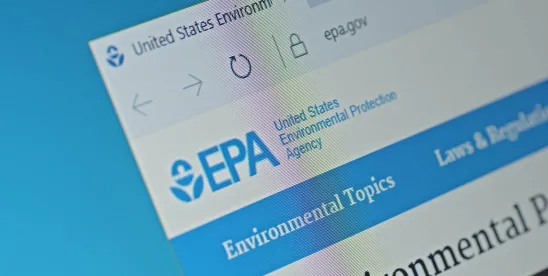A decision from the Environmental Protection Agency’s (EPA) Environmental Appeals Board (Board) remanded a final permit for the Atlantic Shores Offshore Wind project (Atlantic Shores Project or Project). The Project, located off the coast of New Jersey, had obtained its final construction permit from the US Bureau of Ocean Energy Management (BOEM) and its Outer Continental Shelf (OCS) Clean Air Act permit from the EPA. In February of this year, the EPA Region 2 filed a motion for voluntary remand, asking the Board to return the permit to the agency so that it could evaluate the Project as part of a comprehensive review required by President Donald Trump’s January 20 Memorandum, which paused all offshore wind leasing on the OCS. This decision is the first permit remand halting an offshore wind project in the late-state permitting phase, resulting in precedent that may affect future offshore wind projects.
Atlantic Shores Project is a joint venture originally between Shell and EDF Renewables, and it holds a lease block off the coast of New Jersey.[1] EPA Region 2 issued a final OCS Clean Air Act Permit in September 2024,[2] and BOEM approved the Project in October 2024.[3] Shortly thereafter, Save Long Beach Island, Inc. (SLBI), a group opposing the Project, filed a petition for review of the September 2024 EPA permit decision.[4]
While SLBI’s permit appeal was pending with the Environmental Appeals Board, President Trump issued a memorandum on January 20 that paused offshore wind leasing on the OCS and mandated a review of the federal government’s wind project leasing practices.[5] It requires the Secretary of the Interior, the Secretary of Agriculture, the Secretary of Energy, the Administrator of the EPA, and the heads of all other relevant agencies to conduct a comprehensive assessment and review of federal wind leasing and permitting practices. They must consider environmental impacts of onshore and offshore wind on wildlife, the economic costs associated with electricity generation, and the effect of subsidies on the wind industry.
EPA Region 2 then filed a motion for voluntary remand, requesting that the Board remand the OCS permit back to the region so that it could reevaluate the Atlantic Shores Project and its environmental impacts in light of President Trump’s memorandum.
The Board granted the motion for remand, returning the permit to the region. The Board concluded that remand was appropriate because no final decision on the OCS permit had occurred, and the Board generally has “broad discretion” to grant a permit issuer’s voluntary remand. It explained that the OCS permit, granted in September 2024, was not a final permit because SLBI filed a petition challenging the permit. At the time the region filed the motion for remand, Atlantic Shores Project did not have its OCS permit. It further reasoned that the agency’s final action does not occur until the regional administrator issues a subsequent final permit decision after all administrative review proceedings have been exhausted. The Board reasoned that regulations state that an applicant is without a permit for a proposed project pending final agency action. Therefore, only after completion of any remand proceeding and final permit decision from the region would Atlantic Shores Project hold a permit. It further supported its decision by explaining that administrative and judicial efficiency favored remand because adjudicating a permit decision that the EPA intends to reconsider “would be at the height of administrative inefficiency” and that issuing an opinion on the merits before the region reevaluated the permit decision would be an advisory opinion, which the Board cannot do.
The Board rejected Atlantic Shores Project’s argument that the region lacked “good cause” for remand because it had not identified any condition precedent in the permit that it sought to reconsider. However, the Board rejected this argument, explaining that it generally treats requests for voluntary remand liberally when the region provides “specific substantive changes” to a final permit or “specific elements of the permit” it wishes to reconsider.
Finally, the Board rejected Atlantic Shores Project’s argument that moving forward with a voluntary remand “without good cause” has the effect of circumventing the permitting time requirements in the Clean Air Act, which require all permit decisions be made within one year. It explained that nothing in the Clean Air Act’s time requirements prohibits the Board from granting a motion for voluntary remand. Additionally, it reasoned that whether any challenges to the statutory time frames are valid is “beyond the scope of Board review.”
The Board granted the region’s motion for voluntary remand and dismissed SLBI’s appeal. Upon completion of the region’s remand proceedings, the permit decision becomes a final agency action subject to judicial review. The Board concluded its decision by stating that it will not require or accept any further appeals on the final permit decision following the region’s remand.
The Board’s decision involving the Atlantic Shores Project may be a limited circumstance because of the specific challenges involved with the permit decision. However, all stakeholders for offshore wind projects should carefully consider the status of their permits and monitor federal review and challenges to their projects’ permits, as well as similarly situated projects’ permits.
[1] Adnan Memija, EPA Withdraws Permit for Atlantic Shores Offshore Wind Project, Offshore Wind (March 17, 2025), available at offshorewind.biz/2025/03/17/epa-withdraws-permit-for-atlantic-shores-offshore-wind-project/; Shell exited the project in February 2025 because of “increased competition, delays, and a changing market,” and EDF also exited later that month. Bruce Beaubouef, Shell Exits Atlantic Shores Offshore Wind Project, Offshore (Feb. 5, 2025), available at offshore-mag.com/renewable-energy/news/55265936/shell-exits-atlantic-shores-offshore-wind-project.
[2] Region 2, US EPA, OCS Air Permit Issued to Atlantic Shores Offshore Wind Project 1, LLC for the Atlantic Shores Project 1 and Project 2, EPA Permit No. OCS-EPA-R2 NJ 02, at 1 (Sept. 30, 2024) (A.R. A.2).
[3] Memija, supra note 1.
[4] Environmental Appeals Board, US EPA, In re Atlantic Shores Offshore Wind, LLC, Permit No. OCS-EPA-R2 NJ 02, Order Granting Motion for Voluntary Remand, at 1 (March 14, 2025), available here at yosemite.epa.gov/oa/eab_web_docket.nsf/9C7B7CF33923032185258C4D0058F4A7/$File/
Atlantic%20Shores%20Order%20Granting%20Motion%20for%20Voluntary%20Remand,%20FINAL.pdf (hereinafter EPA Order Granting Remand).
[5] Temporary Withdrawal of All Areas on the Outer Continental Shelf from Offshore Wind Leasing and Review of the Federal Government’s Leasing and Permitting Practices for Wind Projects, 90 Fed. Reg. 8363 (Jan. 20, 2025), available whitehouse.gov/presidential-actions/2025/01/temporary-withdrawal-of-all-areas-on-the-outer-continental-shelf-from-offshore-wind-leasing-and-review-of-the-federal-governments-leasing-and-permitting-practices-for-wind-projects/.




 />i
/>i

